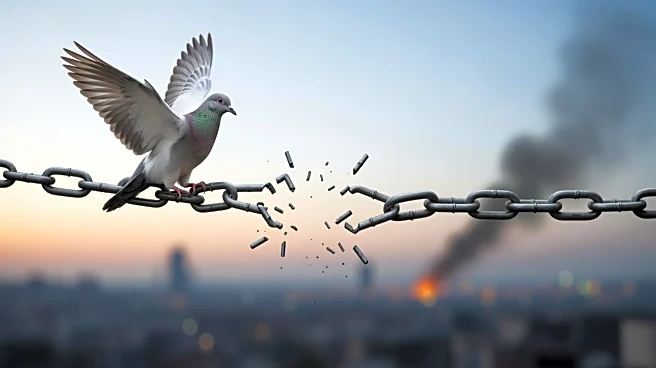What's Happening?
Following two years of intense conflict, Gaza City is experiencing a fragile peace due to a ceasefire that began on October 11. The ceasefire has allowed residents to experience a semblance of normalcy,
with markets reopening and traditional wedding ceremonies resuming. However, the situation remains precarious, as Israeli surveillance drones continue to monitor the skies, and Israeli troops are still positioned in certain areas. Despite the ceasefire, recent Israeli airstrikes have resulted in casualties, highlighting the ongoing tensions. Residents are cautiously optimistic, enjoying small luxuries like picnics at the beach, but remain uncertain about the future.
Why It's Important?
The ceasefire in Gaza City is significant as it provides a temporary respite from the violence that has plagued the region for years. It allows for humanitarian aid and commercial goods to enter, alleviating some of the starvation and scarcity experienced by residents. However, the continued presence of Israeli forces and surveillance indicates that the peace is fragile and could be disrupted at any moment. The situation in Gaza is a critical issue for international diplomacy, as it affects regional stability and the lives of countless civilians. The ceasefire's success or failure could have broader implications for peace efforts in the Middle East.
What's Next?
The future of Gaza City remains uncertain, with negotiations ongoing to solidify the ceasefire and address the underlying issues of the conflict. The international community is closely monitoring the situation, with potential diplomatic interventions to ensure lasting peace. Residents hope for a stable environment where they can rebuild their lives, but the threat of renewed violence looms. The next steps will likely involve complex negotiations between Israeli and Palestinian leaders, with international stakeholders potentially playing a role in facilitating dialogue and ensuring compliance with ceasefire agreements.
Beyond the Headlines
The ceasefire in Gaza City highlights the resilience of its residents, who continue to find ways to celebrate life despite the hardships. The reopening of markets and resumption of cultural practices like weddings signify a desire for normalcy and hope for the future. However, the ongoing military presence and surveillance underscore the challenges of achieving lasting peace. The situation raises ethical questions about the impact of prolonged conflict on civilian populations and the responsibilities of international actors in supporting peace efforts.








